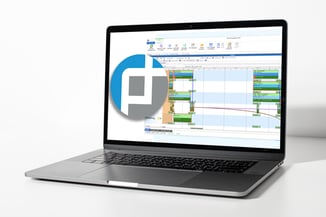Demand Forecasting Models for Production Planning
From producing life-saving medications to crafting intricate medical devices, every step in the medical manufacturing process must be meticulously planned and executed. One of the key pillars of this planning is demand forecasting—a process that involves predicting future demand for products accurately.
In this blog, we look into the significance of demand forecasting models for production planning in medical manufacturing facilities, and how integration between PlanetTogether and leading ERP, SCM, and MES systems can elevate this crucial aspect of operations.

Demand Forecasting
Demand forecasting is the process of predicting future demand for products based on historical data, market trends, and other relevant factors. In the context of medical manufacturing, accurate demand forecasting is essential for several reasons:
Optimizing Inventory Management: By forecasting demand accurately, manufacturers can maintain optimal inventory levels, reducing the risk of stockouts or excess inventory.
Efficient Resource Allocation: With insights into future demand, manufacturers can allocate resources such as manpower, raw materials, and equipment more effectively, ensuring smooth production operations.
Meeting Customer Expectations: Timely and accurate production planning based on demand forecasts enables manufacturers to fulfill customer orders promptly, enhancing customer satisfaction and loyalty.
Cost Reduction: By minimizing inventory holding costs and optimizing resource utilization, effective demand forecasting contributes to overall cost reduction in the manufacturing process.

Demand Forecasting Models
Various demand forecasting models exist, each suited to different scenarios and data characteristics. Some of the commonly used models include:
Time Series Analysis: This model relies on historical data to identify patterns and trends in demand over time. Techniques such as moving averages, exponential smoothing, and autoregressive integrated moving average (ARIMA) are employed to forecast future demand.
Regression Analysis: Regression models analyze the relationship between demand and various factors such as price, promotional activities, and economic indicators to predict future demand.
Machine Learning Algorithms: Advanced machine learning algorithms, including neural networks, random forests, and support vector machines, can analyze large datasets and identify complex patterns to forecast demand accurately.
Market Research and Expert Opinion: In addition to quantitative models, qualitative methods such as market research and expert opinion are valuable for incorporating subjective insights and market intelligence into demand forecasts.

Integration with PlanetTogether and ERP/SCM/MES Systems
Integration between production planning software like PlanetTogether and enterprise resource planning (ERP), supply chain management (SCM), and manufacturing execution systems (MES) is crucial for streamlining operations and enhancing the accuracy of demand forecasting. Let's explore how integration with leading ERP, SCM, and MES systems such as SAP, Oracle, Microsoft Dynamics, Kinaxis, and Aveva can optimize production planning:
Seamless Data Flow: Integration ensures seamless data flow between different systems, eliminating manual data entry and reducing the risk of errors. Real-time data synchronization enables planners to make informed decisions based on the latest information.
Comprehensive Insights: By combining production planning data from PlanetTogether with information from ERP, SCM, and MES systems, manufacturers gain comprehensive insights into demand, inventory levels, production capacity, and resource availability. This holistic view facilitates more accurate demand forecasting and production planning.
Scenario Analysis: Integration allows for scenario analysis by simulating different demand scenarios and assessing their impact on production schedules, inventory levels, and resource utilization. Planners can evaluate various what-if scenarios and devise contingency plans to mitigate risks.
Adaptive Planning: With integration between PlanetTogether and ERP/SCM/MES systems, production plans can be dynamically adjusted in response to changing demand patterns, market conditions, or supply chain disruptions. Adaptive planning capabilities enable manufacturers to maintain agility and responsiveness in a dynamic business environment.
In the highly regulated environment of medical manufacturing, demand forecasting plays a pivotal role in driving operational efficiency and customer satisfaction. By leveraging advanced forecasting models and integrating production planning software like PlanetTogether with leading ERP, SCM, and MES systems, manufacturers can optimize production planning processes, streamline operations, and stay ahead of the competition.
As technology continues to evolve, embracing integrated solutions will be key to meeting the ever-changing demands of the medical manufacturing industry.
In essence, the integration between PlanetTogether and ERP/SCM/MES systems isn't just about connecting software; it's about connecting processes, data, and people to create a cohesive and agile manufacturing ecosystem that can adapt to the complexities of the medical manufacturing landscape. With accurate demand forecasting as the foundation, manufacturers can build a more resilient and efficient production infrastructure that drives innovation and excellence in healthcare delivery.
Are you ready to take your manufacturing operations to the next level? Contact us today to learn more about how PlanetTogether can help you achieve your goals and drive success in your industry.